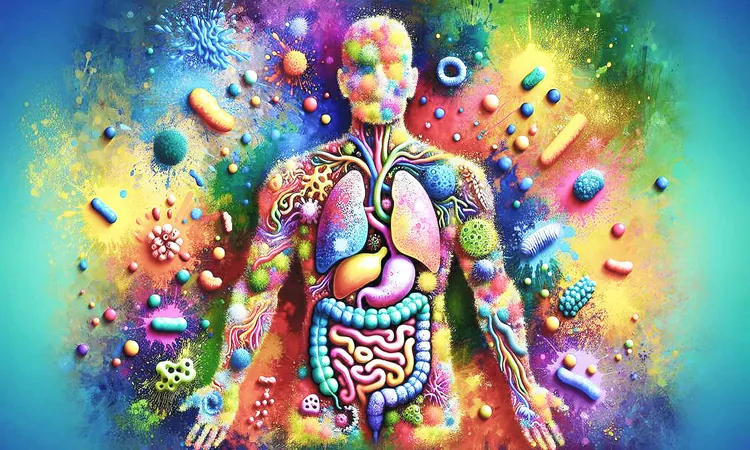
Your Microbiome Is As Unique As Your Fingerprint: Unveiling the Hidden World Within
2025-04-01
Author: Chun
Introduction
In a groundbreaking study, researchers have uncovered that human bodies are home to trillions of bacteria, forming a 'head-to-toe' microbiome that is as distinct and personal as one's fingerprint. These microbial communities play a critical role in various bodily functions, such as digestion, immunity, and even mental health. The implications of these findings could revolutionize personalized medicine, offering tailored health strategies based on individual microbiomes.
Study Overview
Led by Michael Snyder, Ph.D., from Stanford University, this extensive six-year study closely monitored the microbiomes of participants aged 29 to 75. By collecting samples from the gut, mouth, nose, and skin, the team observed how these communities shifted in response to short-term illnesses, chronic conditions, and everyday life factors. The research emphasizes that each person's microbial composition is shaped by a complex interaction of genetics, diet, and immune responses.
Diversity of Microbiomes
With approximately 39 trillion microbes residing in our bodies, the study's findings highlight the vast diversity present among individuals. Snyder notes, "Our results underscore the idea that we each have individualized microbiomes in our bodies that are special to us." This diversity is crucial for health, as individual bacterial responses can affect one's susceptibility to various illnesses and treatments.
Impact of Illness on Microbiomes
The research revealed temporary changes in microbial populations, particularly in response to short-term infections. For instance, Dr. Xin Zhou pointed out that those with Type 2 diabetes exhibited a less stable and less diverse microbiome, indicating a potential link between microbial variety and certain health conditions. Meanwhile, short illnesses could lead to immediate dysregulation of the microbiome.
Stability of Personal Microbiomes
While some may assume that shared bacteria among populations are the most stable, the study challenges this notion. Instead, it reveals that an individual's personal microbiome remains surprisingly consistent over time, even when faced with environmental changes.
Interconnectedness of Microbiomes
A fascinating aspect of the study is the interconnectedness of microbiomes across the body. Changes in the gut often coincide with shifts in the nose, mouth, and skin, suggesting that these microbial populations operate as a cohesive, fluid system. Understanding these links could provide deeper insights into how our bodies react to various stimuli and health challenges.
Future of Microbiome Research
The importance of the human microbiome goes beyond simple health monitoring; it could lead to predictive medicine where an individual's microbial composition helps forecast their responses to treatments and illnesses. Researchers are exploring how lifestyle changes, such as dietary adjustments, can reinforce healthy bacteria and improve metabolic health.
Conclusion
As scientific understanding of the microbiome evolves, interest in its potential to influence everything from digestion to mood increases. Future possibilities include creating personalized probiotics and therapies that cater to an individual's unique microbiome, enhancing overall well-being. Moreover, ongoing research continues to explore how gut microbes communicate with the brain and influence mental health.
Final Thoughts
The study's findings, published in Cell Host & Microbe, signal just the beginning of a deeper exploration into our microbial inhabitants. With each body's microbiome being a unique habitat, the need for individualized care plans is more critical than ever in the pursuit of optimal health. As we unlock the mysteries of our personal bacterial ecosystems, the journey towards tailored health interventions is promising, paving the way for a future where treatments are as unique as our microbiomes themselves.
Stay informed and subscribe to our newsletter for the latest breakthroughs in microbiome research and personalized medicine!



 Brasil (PT)
Brasil (PT)
 Canada (EN)
Canada (EN)
 Chile (ES)
Chile (ES)
 Česko (CS)
Česko (CS)
 대한민국 (KO)
대한민국 (KO)
 España (ES)
España (ES)
 France (FR)
France (FR)
 Hong Kong (EN)
Hong Kong (EN)
 Italia (IT)
Italia (IT)
 日本 (JA)
日本 (JA)
 Magyarország (HU)
Magyarország (HU)
 Norge (NO)
Norge (NO)
 Polska (PL)
Polska (PL)
 Schweiz (DE)
Schweiz (DE)
 Singapore (EN)
Singapore (EN)
 Sverige (SV)
Sverige (SV)
 Suomi (FI)
Suomi (FI)
 Türkiye (TR)
Türkiye (TR)
 الإمارات العربية المتحدة (AR)
الإمارات العربية المتحدة (AR)